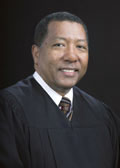Judge rejects call to vacate decision in Proposition 8 case

James Ware
As expected, a federal judge in San Francisco on Tuesday refused to vacate last year’s landmark ruling that Proposition 8 is unconstitutional.
U.S. District Court Chief Judge James Ware of the Northern District of California issued a 19-page decision saying, “The sole fact that a federal judge shares the same circumstances or personal characteristics with other members of the general public, and that the judge could be affected by the outcome of a proceeding in the same way that other members of the general public would be affected, is not a basis for either recusal or disqualification” under federal laws governing the Judiciary. “Further,” said Ware, under the U.S. Code, “it is not reasonable to presume that a judge is incapable of making an impartial decision about the constitutionality of a law, solely because, as a citizen, the judge could be affected by the proceedings.”
The June 14 decision is yet another blow to the efforts of opponents to marriage equality to defend a constitutional amendment they convinced voters to pass in November 2008. In August 2010, Judge Vaughn Walker, then U.S. District Court Chief Judge, ruled that Proposition 8 violates the federal constitution’s guarantees of equal protection and due process. Though Yes on 8 proponents won a stay of Walker’s decision pending their appeal to the 9th Circuit U.S. Court of Appeals, they immediately stumbled on the question of standing.
The state’s governor and attorney general decided not to appeal Walker’s decision, and the legal team challenging Proposition 8 argued that Yes on 8 proponents have no right to appeal the decision on their own.
A 9th Circuit panel heard arguments on the standing issue and asked the California Supreme Court to indicate whether it thinks there is anything in California law that gives Yes on 8 authority to appeal Walker’s decision.
Opponents of Proposition 8 said they believed Yes on 8’s motion to vacate Walker’s ruling was an attempt to salvage some victory from their anticipated defeat on the question of standing.
But in court before Judge Ware Monday, Yes on 8 attorney Charles Cooper said his team genuinely believes that Walker should have disclosed to all parties to the Proposition 8 trial that he has been in a relationship with a man for the past 10 years. Cooper said Walker’s relationship put him in “precisely” the same shoes as the two plaintiff couples challenging Proposition 8. And, as such, he said, a “reasonable person” could believe the judge had a potential to benefit from his ruling striking down Proposition 8.
But Judge Ware seemed highly skeptical of the argument Monday and repeatedly asked for “evidence” that Walker had any interest in marrying. Cooper had none.
“It’s common sense, and a reasonable person would conclude that Judge Walker had an interest in marrying,” said Cooper.
“So, there are not facts to suggest Judge Walker wanted to change his relationship to marriage,” said Ware.
Ware rejected an argument from the team challenging Proposition 8—represented in court Monday by Ted Boutrous. Boutrous argued that Yes on 8 attorneys knew of Walker’s relationship long before he spoke of it to reporters in April this year. Ware said he did not find articles in 2010 to provide “a basis for imputing to [Yes on 8 attorneys] knowledge of Judge Walker’s same-sex relationship.”
Ware said it is “inconsistent with the general principles of constitutional adjudication to presume that a member of a minority group reaps a greater benefit from application of the substantive protections of our Constitution than would a member of the majority…. [W]e all have an equal stake in a case that challenges the constitutionality of a restriction on a fundamental right.”
Ware did not buy Cooper’s argument that Walker’s failure to disclose his relationship to attorneys before the trial suggested he was hiding a potential conflict of interest.
“Absence of disclosure could equally connote ambivalence or uncertainty in the face of such a weighty question as whether one intends to marry now or in the future, especially when such an intent involves the willingness and participation of a partner for whom the judge cannot answer,” wrote Ware.
Boutrous told reporters Tuesday that Yes on 8 may try to appeal Ware’s decision, but that they could run into issues of standing once again.


No surprise there. It was a legal no brainer.
[…] federal judge ruled that Judge Vaughn Walker’s decision to overturn California’s Prop 8 ban on marriage for same-sex couples must stand. Proponents of the ban sought to overturn […]